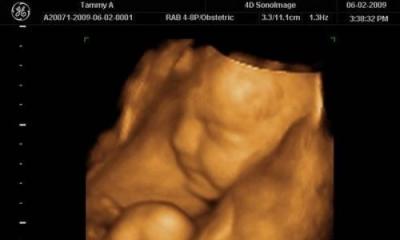The 24th week of pregnancy refers to the most comfortable period, when there is no toxicosis, and the stomach is not yet large enough to bring discomfort. Therefore, free time can be devoted to preparing for the birth of a baby. Frequent walks also have a positive effect on your mood and condition. In addition, the successful development of the fetus directly depends on your lifestyle. You can now clearly feel his movements and pushes. And sometimes you can even understand when he hiccups! Having fallen in love with your current state, you will become happier and more attractive.
Even though the baby takes up most of the uterus, he can still move comfortably and freely inside it. He listens more attentively to the sounds around him and is already able to notice a change in the situation.
If the baby is very frightened by something, then you can calm him down for a very long time.!
Size, weight and height of the fetus
Your baby is growing very fast. But his face no longer changes - exactly as it is now, you will see him when he is born. The size of the fetus at week 24 is as follows: weight is 550-600 g, height is about 30 cm.
![]()
Intrauterine life of the baby
The full development of the fetus at the 24th week of pregnancy is the most important thing that a woman who is preparing to become a mother should think about. So, what happens in the intrauterine world?
- By this time, all organs and organ systems in the child are formed. The digestive, circulatory and nervous systems continue to develop;
- Hearing and vision of the fetus also continue to improve;
- Now the baby's reflexes and feelings are being formed;
- The number of heartbeats is 130-160 beats per minute;
- During its activity, the baby swings its arms and legs, often pushes off the wall of the uterus and makes coups. By the way, the fetus at the 24th week of pregnancy is already most often located in the womb with its head down;
- The baby begins to produce growth hormone, and from now on it will grow even faster, gaining fat;
- Most of the time the child sleeps (16-20 hours), however, he already has a well-developed sleep and rest regimen. Sleep, like that of an adult, is divided into fast and slow phases;
- The eyes are still covered with a thin film, they will open a little later;
- Well-developed facial expressions allow the child to frown, squint, puff out his cheeks and stretch his lips;
- The baby, while in the womb, can suck his finger, swallow amniotic fluid, respond to his mother's strokes with pushes of arms and legs.
The condition of the expectant mother for a period of 24 weeks
The well-being and condition of each pregnant woman is unique. Some of them are blooming right before our eyes! Their skin becomes soft and clean, their nails healthy and strong, and their hair shiny and thick. However, the opposite cases are not uncommon: brittle nails, dry skin, hair loss, and, in addition, the formation of age spots.
Sometimes pregnant women are worried about heartburn, back pain, nausea - such a list is the norm for this period, but is extremely rare. Insomnia attacks, nasal congestion and forgetfulness are often observed, but these are temporary symptoms, you should not worry about them.
Proper nutrition and proper rest can relieve most of the unpleasant symptoms.
Symptoms and features of the course of pregnancy
- puffiness. There may be slight swelling on the face or legs. In order to avoid this, it is necessary to reduce the amount of salt intake, but not the amount of liquid, as some believe (if you drink no more than 2 liters of water per day, of course);
- Breast change. The breast becomes larger, the nipples darken. Some women even notice colostrum secretion;
- Stretch marks. Stretching of the skin is associated with rounding and rapid growth of the abdomen;
- Increased sweating. There are problems with sweating. Therefore, it is recommended to take a shower more often and not to wear synthetic underwear. Previously used deodorant is best replaced with cosmetics designed specifically for pregnant women;
- Frequent urination. Frequent or difficult urination is associated with an increase in the size of the uterus and fetus;
- Constipation. The situation can be corrected by eating enough plant fiber, which is found in many fruits and vegetables.
Characteristic sensations and contractions
- Drawing pains in the lower abdomen. The pelvic bones expand, preparing for the upcoming birth, in connection with this, such sensations arise;
- Training bouts. Feeling contractions according to Braxton-Hicks (irregular, painless contractions) is not a deviation, as long as the contractions do not last long and no more than 4 times per hour;
- Fatigue. Long walking without a break or sitting in one position for a long time can not in the best way affect the health of the crumbs. In view of your position, try not to neglect rest when the body needs it.
Psycho-emotional experiences of the expectant mother
Pregnancy and childbirth is a great happiness, but it is not uncommon to find manifestations of prenatal depression. Women begin to experience fear of the unknown. Frequent mood swings, tears, sadness, sadness - all these are clear signs of such a condition, which is difficult to deal with alone.
An important role here is played by the support of loved ones who will paint a picture of the future, where you are a happy mother of a healthy baby who was born at the appointed time without complications, who will grow and develop well every month. Emotions of joy should fill you!
There is very little time left before this long-awaited meeting with the baby. In addition, always remember that the emotional connection between the child and mother during pregnancy, as well as in the first year of life, is very strong.
This is due to the fact that the baby's nervous system has matured to the ability to respond to the mother's emotions. What happens at 24 weeks of pregnancy with a child if a woman is nervous or worried? The stress hormone goes directly to the fetus, creating a feeling of discomfort and anxiety that lasts for several hours.
Your ever-growing belly
The abdomen grows in proportion to the growth of the uterus. By this time, it had already become noticeably rounded. Due to the tension of the skin, the vascular network may be visible on it. It is important to start using products that prevent the appearance of stretch marks before stretch marks appear, otherwise it will be almost impossible to remove them later.
On average, you should gain from 300 to 500 g per week. Over the entire period of pregnancy, weight gain is already about 6-8 kg.
This is how charming tummies with peanuts inside look like at 24 weeks of pregnancy:

Necessary medical examinations and ultrasound
Do you want something interesting?
When visiting a doctor at this time, it is necessary to pass a urine test, a blood test for diabetes mellitus, and a second test for HIV.
By the twenty-fourth week of pregnancy, a planned ultrasound examination should be completed, but if any abnormalities or ambiguities arise, the possibility of a second referral should not be ruled out.
Reasons why doctors prescribe an additional ultrasound:
- sharp pain in the abdomen;
- discharge with blood;
- transferred infectious diseases;
- suspicion of placental abruption;
- developmental delays in the child.
Ultrasound at the twenty-fourth week of pregnancy will not harm, moreover, the doctor will know exactly about the development, well-being and activity of the crumbs. In addition, he will be able to assess the tone of the uterus and the condition of the cervix, examine the amount of amniotic fluid and blood flow in the arteries of the umbilical cord.
Another additional examination is cardiotocography (CTG). The device, consisting of two sensors, helps to obtain comprehensive data on the heartbeat and motor activity of the baby, as well as on the tone of the uterus.
Possible complications of this period
The 24th obstetric week of pregnancy is equal to twenty-two weeks from conception and the twentieth week from the delay of menstruation. A pronounced messenger that something is not right in the body of a pregnant woman is discharge. Drops of blood from the vagina, clear discharge in large quantities, or brown mucus from the uterus should alert you.
Sharp pain in the pelvis and abdomen, vomiting, pain when urinating, fever and darkening of the eyes also symbolize the presence of abnormalities.

Pain in the legs can speak not only of fatigue, but also indicate vein thrombosis. The growing uterus puts pressure on the veins in the pelvic area, resulting in the formation of blood clots. The area of the leg where the blockage of the vein has formed swells and turns red.
After an additional ultrasound, doctors can diagnose polyhydramnios or oligohydramnios (the amount of amniotic fluid is more or less than normal). In this case, we can talk about your immediate hospitalization.
Placenta previa, uterine rupture, and infections can cause bleeding. It is also very important during pregnancy to prevent such a dangerous disease as preeclampsia (late toxicosis). The main symptoms of preeclampsia are: weight gain over 20 kg, massive edema and increased blood pressure.
It is important to determine the first signs of preeclampsia in a timely manner in order to immediately begin treatment, otherwise it can be dangerous for placental abruption and even the death of the mother and fetus.
All pregnant women have probably heard of iron deficiency anemia. It is accompanied by a decrease in the level of hemoglobin in the mother's blood, as a result, the cells and tissues of the body do not receive oxygen to the right extent. Symptoms at 24 weeks of gestation that may indicate the development of anemia:
- general weakness;
- dizziness;
- noise in ears;
- pallor;
- dyspnea;
- headaches.
With the above violations, you should urgently consult a doctor in order to avoid the risk of premature birth or the development of abnormalities in the fetus.
Intimate life of future parents
Pregnancy is not a disease. In its normal course, intimate life is permissible. But the best thing, of course, is to get advice from a gynecologist who you are seeing during pregnancy.
You can have sex if there are no such contraindications as:
- risk of miscarriage;
- the presence of infection in one of the partners;
- placenta previa;
- bloody or brownish discharge.
In the absence of deviations, sex is completely safe. Moreover, the positive emotions of the mother will be transferred to the child with the hormone of happiness. It is impossible to harm a baby. The only limitation is to reduce the pressure on the stomach as much as possible.
It is advisable to use a condom to avoid infection. Violation of the microflora of the vagina can provoke premature birth or rupture of the membranes.
Regular sex life during pregnancy is a kind of physical activity, due to which the birth canal becomes soft and elastic. At a later date, the hormone contained in male sperm can positively affect the cervix and help it open well during the birth process.
- If possible, keep a notebook where you can record the activity of the fetus. The higher the gestational age, the more carefully and responsibly it is necessary to count the number of shocks;
- Significant weight gain at this stage of pregnancy is not uncommon. Therefore, the balance and quality of nutrition become especially important. It is necessary to exclude fatty, sweet, spicy and salty foods. It is recommended to refrain from eating exotic foods;
- The introduction to the diet of foods containing a large amount of fiber or having a natural laxative effect will serve as a prevention of hemorrhoids;
- Compliance with the daily routine, regular non-tiring walks will improve well-being;
- Cooling baths and evening foot massage perfectly relieve fatigue;
- The use of special creams or oils for stretch marks intended for pregnant women will significantly reduce the degree of formation of stretch marks on the skin;
- Try to avoid crowded places and avoid hypothermia. So you will significantly reduce the percentage of colds, which are very undesirable in your position;
- Regular, but very careful, gymnastics and yoga will help to fill the world with harmony;
- Properly selected things and shoes, the rejection of heels will relieve discomfort;
- Sign up for courses for expectant mothers;
- Classical music affects the development of the mental and creative abilities of a child in the womb;
- A timely visit to the antenatal clinic if any signs of deviations are found will help prevent harmful consequences and bear a healthy baby.
And remember, throughout your pregnancy, you bear a huge responsibility not only for yourself, but also for the health of your unborn child!
This material is for informational purposes only, before using the information provided, you must be sure to consult with a specialist.








